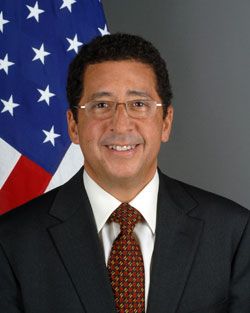The Energy Sector Is in Flux

Specialist welders are seen as they weld two pipeline pipes together at the construction site of a new liquified natural gas terminal on September 23, 2022 near Brunsbuettel, Germany. The terminal, which will allow the import of natural gas from ships transporting the gas in its liquified form, is the second Germany is currently building in an effort to offset diminished gas imports from Russia.
Photo by Morris MacMatzen/Getty Images
2022 was one of the most significant years in the global energy sector since the 1973 OPEC crisis, with the conflict in Ukraine, the climate transition, the upending of the oil and gas markets, and the canceling of Nord Stream 2.
In their latest podcast episode, the Altamar team of Peter Schechter and Muni Jensen spoke to energy expert David Goldwyn, who believes that the state of flux is likely to continue. Goldwyn is president of Goldwyn Global Strategies, an international energy advisory consultancy.
So far, Goldwyn says, Europe is breathing a “sigh of relief,” and has passed the winter without much damage. But the worst may still be yet to come. “The weather was warm, and China had COVID restrictions. So demand was down from other countries. but if Europe really swears off Russian gas, where will that substitute gas come from? And unlike oil, there aren’t massive spare caverns and spare capacity of LNG, which can come to the rescue.”
The impact of sanctions on Russia’s energy sector has been profound, Goldwyn thinks. “I think it will be felt over time. There’s no question that last year, Russian exports did not drop significantly. But looking at the price cap, it depressed the price so much that Russians really weren’t making much money off of it — a lot of the price went to the insurer or the shipper.”
“Russian crude is trading at a $25 discount to other crudes, and they have drawn down their sovereign wealth fund and their reserves significantly. What will happen over time is that Russia will either have to live with significantly lower revenues, or it will have to shut in production. And as it shuts in production, either of gas or of oil, then it will permanently suffer a loss in both revenue and relevance.”
The Winners and Losers
“I think Russia has been the biggest loser,” Goldwyn says. “They’ve destroyed their credibility as a reliable supplier. Europe unfortunately has been a big loser as well. They have suffered incredibly high electricity prices and some de-industrialization. And the developing world, where you tend to have petroleum prices or electricity prices subsidized. The government pays the difference between the market price and the consumer price. So that’s enormous fiscal pressure on those governments, which deprives them of an ability to invest in development, and they are suffering.”
And the winners? Goldwyn said, “Relatively speaking, the United States and the Middle East have been winners. The U.S. has an enormous domestic supply of hydrocarbons, and we’re largely disconnected from the global gas market. So that means our gas, and natural gas prices are not so high, and therefore, our electricity prices are not so high. So we’re in a significantly better competitive position. And I would say, for the time being, the Middle East has benefited from high commodity prices. They’ve been a fiscal winner as well, but that’s unlikely to last for a long time.”
Goldwyn says that China remains a hard power leader, but its role in the world and its vulnerability have been highlighted by this crisis. “Both their inability to manage a domestic health crisis, and they’re essentially dependent on Russia as their gas station. That puts them in a vulnerable position. If you’re trying to export to the world and you’ve aligned yourself with the world’s weakest economies and essentially in competition with the world’s strongest economies, it’s not clear that that’s a great long-term strategy.”
Has the Renewables Revolution Finally Arrived?
According to Goldwyn, “It’s too early to tell whether renewables can be scaled up and deployed globally in a way that will get us to net zero by 2050. The U.S. and Europe are looking at scaling up offshore wind, onshore wind and renewable deployments. For industries that require fuel, like aluminum and steel, that really can’t use solar and wind to generate electricity, we’ve got cleaner forms of hydrogen.
“But we have to make progress on direct air capture and make it more cost competitive. We have to bring down the cost of sustainable biofuels and electrolyzers for hydrogen before that’s really going to be competitive. The real delta here is storage, battery storage.
“In 15 years, the OPEC countries will be less politically important. And they will need to diversify, or they will become very poor countries. And I think that is not news to them on either front. That’s why I think there is a bit of a rush to maximize the value of hydrocarbons in the near term for them and to re-channel that money into diversification.”
The Challenge for Developing Countries
“There’s a lot of private capital, which, if governments provide some credit support, will invest in those countries. So, I think there’s real hope there and new mechanisms [for mitigation], and there’s a policy path forward. Adaptation is different. You can’t make money on adaptation. That’s where we really owe these countries this money. And we haven’t delivered yet.”
What does David Goldwyn think the energy world will look like in five years? He said, “The future of energy is bright. I would say in five years, the world may not look a whole lot different than it does right now, but change will be on the horizon.
“If you look at the suite of next-generation technologies, advanced voltaics, faster windmills, fusion, battery storage, even new kinds of sequestration, right now we’re in the R&D phase, but five years from now, we’re going to have a real bead on what works and what doesn’t, and we will see that horizon. So, I’m optimistic, but five years — not so big a change. Ten years — let’s hope it’s major.”







